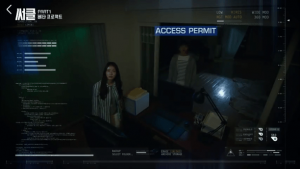
Starting off, for the most part, Circle‘s non-formulaic K-drama storytelling style worked well. The beginning and middle of the series created a feeling much akin to what I felt when I explored a dark expanse of the forest behind my house in the middle of the night as an elementary schooler. At the time, I couldn’t see where I was heading as I traversed the darkness, but the thrill of this uncertainty propelled me to keep going.
But, obviously, I didn’t hope to meander around in the woods forever. At some time or another, I expected to be led out of the forest, perchance into the bright clearing from where I could see my house. This was another part of the forest expedition’s appeal: I made the presumption that I had a safety net — that there would be a clear and secure exit laid out for me. This made a small but substantial difference in my adventure, replacing what could have been a continuously mounting fear that I’d never make it out alive, with a sense of excitement.
The third part of the forest exploration’s allure involved my assumption that I would gain interesting, new experiences that could be memorialized in the form of entertaining future anecdotes and pleasant memories, which would maybe prompt me to actually relive the experience by exploring the forest a second time. In this way, my childhood exploration of the woods is like watching a show. Just reread the previous two paragraphs and swap the phrases “clear and secure exit” with a “sound, emotionally satisfying ending” and “exploring the forest a second time” with “rewatching the show.” Of course, the forest analogy can’t be applied to all shows, but as reiterated previously, Circle does fit in with this comparison well due to its narrative style.
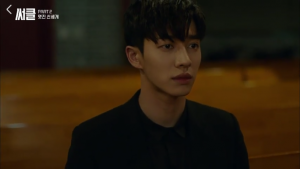
And, okay, being completely lost in a dark forest at night has much more dangerous implications than getting a bad ending in a show, but that’s not the point here. What I’m getting at is we, the viewers, are past the stage where we can feel excitement simply by getting strung along in the dark by Circle‘s narrative. Now is the time where we should expect to see the reliable exit laid out for us — the sound ending
In a show like Circle, where information is intentionally obscured to create mystery, its usually the case that viewers aren’t guaranteed resolutions to the mysteries but expect them anyway. Because of this, a really good ending for a series like Circle involves a precarious balancing act. It has to tie up all loose ends concerning the characters and plot neatly but in a way compelling enough so the viewer doesn’t feel cheated. It has to proffer a sense that all the guessing and waiting around was worth it. And for rewatch value, there has to be a degree of open-endedness involved, pertaining, perhaps, to complexity of themes and/or a multilayered plot that could be better understood through a second viewing. Now, does Circle check off all these boxes?
In short, the answer is no. The drama certainly fulfills some of these requirements but falls short of others. As needed, it ties up the loose ends of the plot. But be that as it may, answering all the questions the plot raises is only the bare minimum required of a good ending. In the forest analogy, it can be compared to the dirt and grass beneath our feet that creates the ground supporting our weight in the breadth of the clearing.

On the outset, all of the backgrounds and whereabouts for the various characters and plot threads are finally revealed. We learn that Human B existed long before the official creation of Smart Earth, as they reveal themselves in the present-day timeline as the mysterious organization backing up Professor Han Yong-woo and his research project. Park Dong-geun finds out that Woo-jin is the key to operating a supercomputer that allows the storage of memory in a video file format. He takes full advantage of this knowledge to to overtake Yong-woo’s position as Human B’s researcher. We also learn that Professor Han is kept in captivity by Dong-geun in 2017 all the way up until 2037.
In the present timeline, Dong-geun then predictably blackmails Woo-jin with Bum-gyun‘s life to obtain Kim Gyu-chul‘s long lost research data, only to find out that Gyu-chul destroyed it permanently at Byul’s request. As Woo-jin flees from an altercation with Dong-geun, the college-aged Hyun-seok accidentally runs him over with his car, severely injuring him.
However, to keep the supercomputer active, Dong-geun is forced to try all means possible to revitalize him, the result being that Woo-jin gets stuck on an extended verge of death, lying in a stage of unconsciousness for many years in the hospital. In their quest to find Woo-jin, Joon-hyuk and Jeong-yeon accidentally stumble across the now-senile Yong-woo, and they learn from him that Woo-jin was killed by Dong-geun several years before. Yet somehow, even with his death, the supercomputer that exists as the foundation for Smart Earth still works, the reason being the creation of Woo-jin’s clone, Circulate 3.
After Circulate 3 somehow wakes up, Joon-hyuk and company concoct a plan to retrieve the comatose Mayor Yoon‘s erased memory in order to reveal Park Dong-geun’s crimes to the whole world. They are successful, which leads to a final showdown of ideals between the Dong-geun-led Human B force and the Joon-hyuk assemblage, culminating in Circulate 3 throwing the supercomputer’s access cube from the roof of a skyscraper and Dong-geun leaping to his death to follow it. After all the fracas is over, Ho-soo gives a rousing speech to the Smart Earth citizens about how the city would be reborn as a solid haven of justice. Meanwhile, our other main characters go on their merry way about their normal lives.
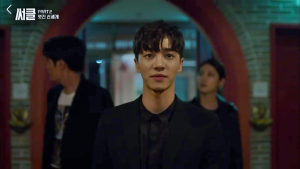
Certainly, the ending scenes answer all the questions raised earlier by the plot. We now know the full history behind Gyu-chul’s story, Byul’s involvement in the creation of Smart Earth, Woo-jin’s disppearance, and Park Dong-geun’s foray into evil. The Big Bad is killed, and there’s a message of hope and change, even. It feels as if the viewer should be entirely emotionally satisfied, but somehow, there’s still a lacklusterness, the reason for this having much to do with how certain themes and ideas are developed.
First and foremost, one of the things that took away from the ending’s impact was the last-minute reveal of Circulate 3. The idea of cloning is briefly alluded to in the beginning, when Park Dong-geun discusses passing a cloning bill with a Smart Earth politician. Afterwards, there is no further mention of the idea — possibly to make the reveal of Circulate 3 all the more shocking.
Although additional development of the idea would have likely taken away from the surprise of the reveal, it could have provided a much-needed lane to explore potentially complex themes at the same time. By saving the idea of cloning until the very end, the show passes up on the chance to insert different thought-provoking perspectives and engaging dialogues on the idea of human cloning.
This is such a shame, because there are so many fascinating different concepts and nuances that can be deeply explored within the subject of human cloning. For instance, the Canadian TV series Orphan Black provides rich commentary on the interplay of nature and nurture by probing into how clones are affected by their environments and how much their backgrounds actually factor into their innate identities and sexualities.
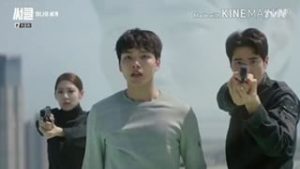
Although this level of thematic exploration into cloning would perhaps be too ambitious for a show whose primary focus is on human memory, it would have been nice to at least see the existence of other clones besides the Circulates, or listen to a perspective from one of the scientists who developed the technology. Adding these things early on would have fleshed out different points of view on cloning, while offering some room to expand into larger underlying themes. Nevertheless, as a result of the late introduction, the idea of human cloning doesn’t come off as an interesting vessel for different themes; it instead feels like a plot device offhandedly added in for the sake of continuity.
Needless to say, even though themes in regards to cloning are definitely underdeveloped, some discussion is still present pertaining to the idea of cloning, after the introduction of Circulate 3. There is room for some musings between Jeong-yeon, Joon-hyuk, and the Normal Earth police force near the end, about cloning and the nature of Woo-jin’s identity. However, because the idea of cloning wasn’t given much discussion before this, and the mechanics behind it weren’t explained very in-depth, the concept of cloning within Circle‘s setting lacked context and — as a result — realism. This robbed the discussion of dynamism and made it less poignant than it could have been.
Moving into the content of said discussion, Jeong-yeon expresses the opinion that because Circulate 3 holds Woo-jin’s memories, he is Woo-jin. Joon-hyuk initially refutes this by bringing up the death of the real Woo-jin and proclaims that Circulate 3 couldn’t be his real brother. Yet he eventually warms up to Jeong-yeon’s idea after having a long talk with Circulate 3, who then unquestioningly takes on the role of Kim Woo-jin.
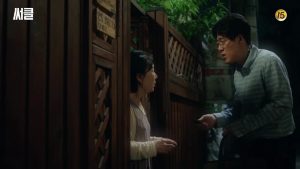
It doesn’t make much sense to me that Circulate 3 would so readily accept the identity of Woo-jin and not face any intrapersonal conflict over his own individuality. In fact, the show doesn’t inject much depth to the clone’s character; rather it seems to indifferently slot him into the role of Woo-jin simply because Jeong-yeon and Joon-hyuk appeared to have already decided for him that he was Woo-jin.
Fleshing out the clone’s inner turmoil over his identity could have added the refinement that the clone idea so desperately needed, but the show chooses to forgo this route — likely to emphasize the memory theme. It articulates that memories define oneself as a person, which is highlighted by how Circulate 3 and Woo-jin are deemed the same people, simply because of the fact that the former has the latter’s memories. The problem is, in the process, the drama completely disregards the complexities that come with cloning. And this is too bad, because poring over a clone’s complex with its own individuality could lend itself to some really insightful discourse about the human identity.
As for the other important theme — how happiness correlates with a loss of bad memories — the show’s stance doesn’t change much from the previous set of episodes. Circle never truly delves into the idea of real happiness.
When Park Dong-geun mentioned that this kind of happiness brought on by memory erasure was what people really wanted, I was reminded of the (possible name basis for the future timeline) novel, Brave New World. Both works of science fiction have leaders that presume that a state of false perpetual happiness is best for their citizens.
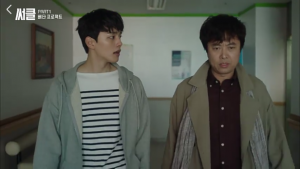
However, the difference is that Brave New World makes it clear that the empty, fleeting, Soma-induced happiness can’t replace true happiness garnered from relationships and philosophy. Circle doesn’t make such a distinction between the happiness created by the elimination of bad memories and happiness gained from the sense of identity built upon both good and bad memories combined. In spite of the fact that it at least asserts its own conclusion about the relationship between happiness and bad memories — sticking firmly to the sentiment that justice served by bad memories should take precedent over the kind of happiness brought on by a loss of such memories — it oversimplifies the concept of happiness, neglecting what could have been a segue into a really compelling theme.
The last thing to consider when looking for a good ending is the character development. This could be paralleled to the foliage and branches in the forest, to the tiny flowers in the clearing — it should have been a mainstay of the overarching plot so that the ending only has to provide small touches to cap it off.
The series definitely fulfills this requirement. Joon-hyuk, Jeong-yeon, and even Park Dong-geun are securely cemented as solid, well fleshed-out characters. In the final episode, we get to see Joon-hyuk quitting the police force and becoming a baker for a patisserie, which is representative of how he comes to terms with his past as Kim Bum-gyun and displays his attempt at incorporating it into his identity.
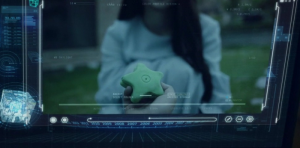
Jeon-yeong also makes peace with her own past and helps Joon-hyuk reconcile with the existence of Circulate 3 as well. This is seen clearly when Dong-geun teases Joon-hyuk with the idea that the original Woo-jin died and that Circulate 3 wasn’t his real brother during their final face-off. In response to his statement, Jeong-yeon proclaims that Woo-jin is a destiny that she and Joon-hyuk are intertwined with — an ever-present entity that motivates them to achieve their goals and provides them with solidarity rather than occupying the traditional notion of a tangible person. Choosing to follow the 2017 Woo-jin’s words, she lives as Han Jeong-yeon instead of Byul. She even revisits the senile Han Yong-woo, embracing him and accepting him as her father.
There’s even a slight hint at romance between Jeong-yeon and Woo-jin in the last episode. This is shown when Woo-jin gets slightly flustered at Jeong-yeon’s stray observation that he drew a heart around his and Byul’s names in the star he gave her as a small child. If romance had been inserted into the beginning or middle of the series, it would have detracted attention away from the central plot and themes. However, as a little tidbit tacked onto the end of the series it works, emphasizing the hopeful sentiment prevalent in the conclusion of the final episode and even adding a degree of open-endedness to it.

Now, earlier, I compared Circle‘s leadership with the one found in Brave New World. However, although their end goals may be similar, Park Dong-geun is no Mustapha Mond. Whereas Mustapha Mond appears to hold the idea that he has to do what benefits society, Park Dong-geun doesn’t appear to have any similar set of ideals. From the get-go, it’s clear that he’s in it for the splendor — rather than revealing any grand set of morals to justify his actions in the scene preceding his death, he is primarily concerned with distracting Joon-hyuk, Jeong-yeon, and Circulate 3 to survive and obtain the cube.
Moreover, what’s interesting is we begin realizing in these last episodes how much Park Dong-geun has really changed through the span of the timelines. His driving motivation is initially self-preservation, seen in how he willingly betrays Woo-jin and Yong-woo in the 2017 timeline in order to spare himself from Human B’s wrath. However, his priorities appear to transform over time, as he begins to amass power as the chairman of Human B and the leader of Smart Earth, becoming enraptured by the clout and influence he gains through his authority. When Circulate 3 throws away the supercomputer access cube, his status is essentially destroyed, so he chooses dying over living without the prestige he came to value so much.
To summarize this review, the series covers some of the bases required of a good ending, but it fails to go the extra mile to create something really noteworthy. It wraps up the plot points neatly so that there are no loose threads left. The characters we’ve grown to know in the series all got their personal closure. There was a little bit of open-endedness (although not enough for me to want to rewatch the show). Perhaps for some, this would be enough.
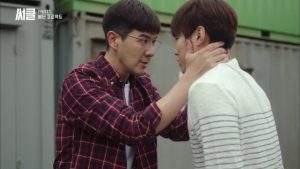
Nonetheless, I came into the series expecting a deep dissemination into themes regarding memory, existence, individuality, and crime, with well-developed characters and an engaging plot. Although the latter two expectations were filled, it fell short of the former, which was slightly disappointing, as it took away the cerebral edge I was initially anticipating.
This isn’t to say that Circle is a bad show. There are definitely moments where the drama really shines, particularly when it comes to its unpredictable plot twists and fast pacing. But to recap what I’ve repeated throughout this review and my previous one, there was too much overall emphasis on its narrative, and not enough attention given to its themes. Since themes provide the backbone for most sci-fi/dystopian stories, I felt a little cheated for not being reciprocated regarding my expectations on this end.
Going back to my forest story, I did get to see the clearing in the end, only to realize that the whole experience was a little underwhelming, albeit still an overall fun adventure — like this drama.
(Images via tvN)


